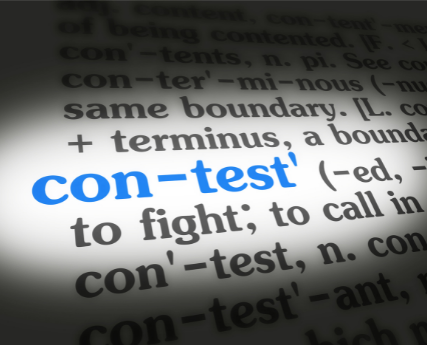
Contesting Your Will
Updated: December 20, 2022
If you have considered everything carefully, can you be sure everything is done according to your wishes after you die? Not always, but there are ways to improve your chances. One of the common reasons this happens is if your will is successfully contested.
Since there has to be a valid legal question about your will for a contest to be considered, the primary method to prevent challenges is to do all that is necessary to assure your will is valid and prevent problems with the probate process.

Although contesting a will requires that a beneficiary file a formal legal challenge against the validity of your will and is a difficult, time-consuming, and expensive process that is rarely successful, you may need to take further steps to prevent someone from successfully contesting it.
There is a way to discourage indiscriminate challenges to your will called a No-contest Clause.
Who Can Contest Your Will
The Probate Code states that only “interested persons,” usually family, can legally challenge your will, including any amendments/codicils. In order to be an “interested party” and be able to challenge a will, one needs to have proof that they fall into one of three categories.
- They are a beneficiary named in any version of your will. For example, any person, even those who are not family, or charity you removed from a subsequent will.
- They are an intestate heir who is not a beneficiary but who would have inherited or lost inheritance if the will was deemed invalid. See Dying without a Will – Laws of Intestate Succession.
- They are an unpaid creditor or any other person having a property right or claim against your estate.
Most people challenging your will must file during the probate process. Minors wanting to contest your will must wait until they reach the age of majority (typically age 18), however your will can be challenged on their behalf by an executor or court representative.
Why Would Your Will be Contested?
 There are four common reasons your will might be contested.
There are four common reasons your will might be contested.
- Creditors can challenge your will if there is proof they were not paid in full from your estate.
- Your heirs may challenge your will if they believe they were unjustly left out or got a disproportionate share in your will.
- Others may challenge if they were removed from your will but still feel entitled to what you had previously left them.
- Your beneficiaries were concerned that you lacked the capacity to understand what was in your will or were under duress or undue influence when making it.
For any heirs or beneficiaries to successfully challenge your will, they need to prove there is a legal reason to invalidate it. Being hurt and angry will not get them a hearing if your will is entirely valid.
There are many technical errors that can be exploited to justify a challenge to your will. If you go to the Making Sure Your Will is Valid section you can review all of the details necessary to make sure you got it right. A mistake or omission of any of those could invalidate parts or all of your will and leave it open to being challenged.
27 states allow holographic wills, which are handwritten and signed by you, but don’t need to be witnessed.
- They are the easiest wills to challenge since the court has to be absolutely convinced that the entire will is in your handwriting and you created it to serve as your will.
- Having no witnesses to verify this compounds the problem.
As long as your will is valid in the state it was created, executing your will in a different state does not invalidate it.
Although included in the “Making Sure Your Will is Valid” section, you may want to give special attention to these reasons for contesting your will.
Contention that you lack Testamentary Capacity is a common reason used by heirs and beneficiaries to justify a challenge.
- By definition testamentary capacity means that, while executing your will, you:
- Understand the nature, extent, and value of your property and how you are disposing of it;
- Recognize your beneficiaries (natural objects), their needs, and of the generosity of your gifts (bounty); and/or
- Are aware of how to distribute your assets to meet these needs.
- To successfully show that you lack testamentary capacity they must prove you had a significant problem with your mental capacity (commonly called “sound mind”) when you signed your will due to senility, dementia, insanity, influence of a substance, or any other reason to affect your mental capacity.
 Concern of the heirs and beneficiaries that:
Concern of the heirs and beneficiaries that:
- You have been defrauded into signing your will, such as being told that you were signing some other document but signed the will instead; and/or
- The will is a forgery.
Concerns that you were under:
- Duress for any reason such as a threat, intimidation, or even pressure from a family member; and/or
- Undue influence or manipulation from another person when you signed the will and lacked the free will to bargain. Many situations can raise this concern, such as a late marriage or a live-in caretaker who appears to have control over everything you own.
Other reasons beneficiaries or others may want to contest your will may include:
- Discovering a more recent valid will;
- An executor may not be aware of your updated will and execute an older one due to lack of communication.
- Once a more recent will is found, it invalidates the older one(s).
- Your children (or other beneficiaries) are competitive and want to “take it to court” or they have very different economic status — Try this quiz from Everplans: Will Your Kids Fight Over Your Estate?;
- Making a gift contingent on some goal, such as getting off drugs or finishing college;
- Leaving money to beneficiaries with mental illness without creating a special needs trust;
- Another beneficiary getting an “advanced inheritance” for current financial reasons, but still getting an equal share after your death;
- Leaving out step children, who may feel entitled if you had a blended family; and/or
- Creating a discretionary trust and leaving the decision to the trustee. While this may be the best way to avoid disputes, it increases the chance of a challenge.
What Happens if the Challenge is Successful?
 If your will is successfully challenged, it can be completely or partially invalidated, but not changed.
If your will is successfully challenged, it can be completely or partially invalidated, but not changed.
- A completely invalidated will could be replaced by a previous valid will.
- If a will is only partially invalidated, that part can be reinstated with a provision from a previous valid will.
- If the entire will is voided or no prior provisions can be found, it’s in the court’s hands. The court will proceed as if your will or that provision never existed and distribute the property according to state laws as if no will had ever existed.
How Can You Prevent This?
-
- You should state in your most recent will that you testify that this is your last will and testament, and that it invalidates any previous wills or codicils.
- Although you are not required to destroy the older wills, it is the best way to assure that a previous or older will is not found to bring to probate court in support of a challenge.
-
- Remember that to sign a will you need to understand your assets, who your heirs and beneficiaries are, and the effect of the will will have on them. You do not need to prove that you are 100% free of cognitive impairment or mental issues.
- You should include a statement that you are sound of mind. By signing your will, any witnesses also testify to this.
- If you are worried that your mental capacity will be questioned, you should talk to your attorney who may advise you to videotape the signing or get medical documentation from your healthcare provider.
-
- Make sure no family members are directly involved or with you when you create and sign your will.
- You should always state in your most recent will that you testify that you are not creating the will under duress or undue influence. By signing your will, any witnesses also testify to this.
- Under some situations where the risk is high, a simple statement in your will may not be enough and you should talk to an attorney who can help you prepare evidence to attest to this.
- Have your will notarized — While this is not a necessary step, it adds an additional witness who is certified to strengthen any claims in the will.
 There are specific measures you can take that do not affect validity, but can still reduce the risk of a challenge.
There are specific measures you can take that do not affect validity, but can still reduce the risk of a challenge.
- Sharing your will with the beneficiaries and getting their input and blessing can significantly reduce the chance of a challenge.
- Leave specific instructions about your wishes for property, especially real estate and businesses, which may prevent beneficiaries from fighting about what was done with those assets.
- When leaving assets to a beneficiary with cognitive deficits or mental illness, create a “special needs trust” that describes in detail how the assets are to be used for their benefit. It also has the benefit of keeping them qualified for Medicaid and other government assistance plans while still receiving trust disbursements.
- Try and foster equal relationships with each of your children. This may prevent the temptation to give more to your children with a better relationship with you. However, if your children recognize that one of them has done much more of your caregiving and agree to it, you may consider giving that person more.
- It is very important to add a modern disinheritance clause for any heir you intentionally leave out of your will. Spelling out the reasons may reduce their risk of a challenge, but becomes a part of the public record..
- Update your will and codicils on a regular basis, about every 3-5 years and/or as needed.
- When giving a gift while you are alive, remember that it can create resentment, tension, and fighting if not done properly.
- If you do consider it an advancement on inheritance, note the gift in Trust language in your will, including that it should be subtracted from their ultimate inheritance.
- If intended as a gift above and beyond the ultimate inheritance, you should have agreement from all parties prior to being part of your will.
Add a Non-contest Clause
Also known as an in terrorem clause, it is a provision in your will stating that if anyone files a lawsuit to challenge what they have inherited in your will, they will receive nothing from your estate if they lose the challenge.
- It typically reads something to the effect of: “Notwithstanding anything herein to the contrary, if any beneficiary contests the terms of this Will, including, without limitation, filing a contest of admission of this Will to probate under [applicable section of the state Probate Code], that beneficiary shall not be entitled to any property under the terms of this Will, and for all purposes of this Will, that beneficiary shall then be deemed to have predeceased me.”
- Although meant to prevent casual challenges from dissatisfied beneficiaries, consequences can vary by state.
- Some states allow challenges without losing inheritance if there is probable cause that is valid, such as errors in the will or evidence of undue influence when the will was created.
- In most states a no-contest clause results in the beneficiaries being unable to make any challenges without losing inheritance, even if valid.
- Florida and Indiana do not recognize no-contest clauses.
- The clause does not prevent someone not mentioned in your current will, but included in a previous version of your will, from contesting it.
Other alternatives include:
- Not preventing the ability to contest, but allowing them to keep their inheritance if they postpone the challenge for a specified time in the hope they will change their mind;
- Putting a clause in the will requiring any disputes to be settled by an outside mediator; or
- Making separate trusts that only the beneficiary will know the contents of.
- Burchette J. 8 Signs Your Family Will Fight Over Your Estate. everplans website. Accessed: December 20, 2021.
- Garber J. How to Prevent Someone From Contesting Your Will. the balance website. Updated: October 25, 2021. Accessed: December 20, 2022.
- Garber J. What Is Contesting a Will? the balance website. Updated: July 13, 2022. Accessed: December 20, 2022.
- Kaminsky M. No-Contest Clauses in Wills and Trusts. legalzoom website. Updated: May 2, 2022. Accessed: December 20, 2022.
- Kotis L. Counterattack: Tips for Thwarting a Will Contest. Kiplinger website. Updated: November 10, 2022. Accessed: December 20, 2022.
- Preventing a Will Contest. Elder Law website. Updated: October 23, 2019. Accessed: December 20, 2022.
- Reasons to Challenge a Will. FindLaw website. Updated: May 9, 2022. Accessed: December 20, 2022.
- Sember B. How to Contest a Will and When You Should. legalzoom website. Updated: May 2, 2022. Accessed: December 20, 2022.
- Sember B. How to Prevent Your Family from Contesting Your Will. legalzoom website. Updated: November 2, 2022. Accessed: December 20, 2022.
- Sember B. Sibling Rivalry What Happens When a Sibling Disputes a Parents Will. legalzoom website. Updated: July 28, 2020. Accessed: December 20, 2022.
- Who Can Challenge a Will? FindLaw website. Updated: October 28, 2021. Accessed: December 20, 2022.
